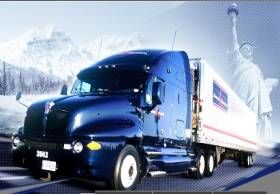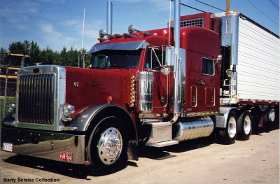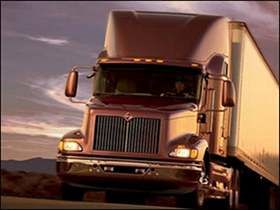Weight Of Truck And Trailor
Topic 1163 | Page 1

Most of the time it's around 30-40,000 pounds but varies from truck to truck..your total weight of tractor and trailer can't exceed 80,000 lbs.

So anything under 40,000 you should be good to go. Even with full tanks
I haven't actually weighed myself with no freight on me. But...
With a 45k load I'm at maximum capacity. So 45 subtract 80 = 35k for tractor and trailer. Keep in mind that with my math it's with 1/2 tank (to stay legal). I also do refrigerated not dry.
But the average weight would be roughly 30-37k. Keep in mind some drivers have extended sleepers, some drive lightweight trucks at Prime. And I spoke with a lightweight driver many times and they say they can take up to 49k of freight so they weigh somewhere around 30k.
I spoke with a lightweight driver many times and they say they can take up to 49k of freight
WHOA!!!! 
That's incredible for reefer. No wonder Prime is so big on those lightweight trucks. That's a huge difference. I couldn't even pull that in a dry van. I'd be maxed out with a little under 47k in the box.
I didn't think those lightweight trucks would make that much of a difference. That's amazing when you consider the size of some of these refrigerated fleets.
Dry Van:
A trailer or truck that that requires no special attention, such as refrigeration, that hauls regular palletted, boxed, or floor-loaded freight. The most common type of trailer in trucking.Reefer:
A refrigerated trailer.
HOS:
Hours Of Service
HOS refers to the logbook hours of service regulations.
What exactly is a lightweight rig? Where do they take the weight out?

What exactly is a lightweight rig? Where do they take the weight out?
Lightweight rigs are mostly the new(er) Freightliners.. They save weight by using lightweight materials like fiberglass and aluminum instead of steel and cast iron..and making the tractor smaller as well as the sleeper...they are pretty spartan as far as creature comforts go.
I spoke with a lightweight driver many times and they say they can take up to 49k of freight
WHOA!!!!
That's incredible for reefer. No wonder Prime is so big on those lightweight trucks. That's a huge difference. I couldn't even pull that in a dry van. I'd be maxed out with a little under 47k in the box.
I didn't think those lightweight trucks would make that much of a difference. That's amazing when you consider the size of some of these refrigerated fleets.
Yeah no joke! I spoke with several and one was a 7 year driver who has been with Prime since they introduced those LW trucks and he's been on them ever since. Beer loads are always difficult to balance because I'm always at maximum capacity and its hard to imagine that even a beer load would be an easy load. I was actually curious what Prime would pay a driver with 1 year OTR experience driving on the LW fleet. That 7 year driver was making 48c per mile as a company driver because of his experience.
OTR:
Over The Road
OTR driving normally means you'll be hauling freight to various customers throughout your company's hauling region. It often entails being gone from home for two to three weeks at a time.
Dry Van:
A trailer or truck that that requires no special attention, such as refrigeration, that hauls regular palletted, boxed, or floor-loaded freight. The most common type of trailer in trucking.Reefer:
A refrigerated trailer.
HOS:
Hours Of Service
HOS refers to the logbook hours of service regulations.
I spoke with a lightweight driver many times and they say they can take up to 49k of freight
WHOA!!!!
That's incredible for reefer. No wonder Prime is so big on those lightweight trucks. That's a huge difference. I couldn't even pull that in a dry van. I'd be maxed out with a little under 47k in the box.
I didn't think those lightweight trucks would make that much of a difference. That's amazing when you consider the size of some of these refrigerated fleets.
Yeah no joke! I spoke with several and one was a 7 year driver who has been with Prime since they introduced those LW trucks and he's been on them ever since. Beer loads are always difficult to balance because I'm always at maximum capacity and its hard to imagine that even a beer load would be an easy load. I was actually curious what Prime would pay a driver with 1 year OTR experience driving on the LW fleet. That 7 year driver was making 48c per mile as a company driver because of his experience.
Daniel, a new driver makes 42c per mile in those lightweights.
OTR:
Over The Road
OTR driving normally means you'll be hauling freight to various customers throughout your company's hauling region. It often entails being gone from home for two to three weeks at a time.
Dry Van:
A trailer or truck that that requires no special attention, such as refrigeration, that hauls regular palletted, boxed, or floor-loaded freight. The most common type of trailer in trucking.Reefer:
A refrigerated trailer.
HOS:
Hours Of Service
HOS refers to the logbook hours of service regulations.
I spoke with a lightweight driver many times and they say they can take up to 49k of freight
WHOA!!!!
That's incredible for reefer. No wonder Prime is so big on those lightweight trucks. That's a huge difference. I couldn't even pull that in a dry van. I'd be maxed out with a little under 47k in the box.
I didn't think those lightweight trucks would make that much of a difference. That's amazing when you consider the size of some of these refrigerated fleets.
Yeah no joke! I spoke with several and one was a 7 year driver who has been with Prime since they introduced those LW trucks and he's been on them ever since. Beer loads are always difficult to balance because I'm always at maximum capacity and its hard to imagine that even a beer load would be an easy load. I was actually curious what Prime would pay a driver with 1 year OTR experience driving on the LW fleet. That 7 year driver was making 48c per mile as a company driver because of his experience.
Daniel, a new driver makes 42c per mile in those lightweights.
Yes sir, I'm wondering what a driver would make coming in with 1 year experience.
OTR:
Over The Road
OTR driving normally means you'll be hauling freight to various customers throughout your company's hauling region. It often entails being gone from home for two to three weeks at a time.
Dry Van:
A trailer or truck that that requires no special attention, such as refrigeration, that hauls regular palletted, boxed, or floor-loaded freight. The most common type of trailer in trucking.Reefer:
A refrigerated trailer.
HOS:
Hours Of Service
HOS refers to the logbook hours of service regulations.New Reply:
New! Check out our help videos for a better understanding of our forum features

















Preview:
This topic has the following tags:
Advice For New Truck Drivers Truck Equipment Understanding The Laws Weight and Scales







 TT On Facebook
TT On Facebook
what is the weight of a tractor with sleeper, dry van empty and fuel tanks full
Dry Van:
A trailer or truck that that requires no special attention, such as refrigeration, that hauls regular palletted, boxed, or floor-loaded freight. The most common type of trailer in trucking.